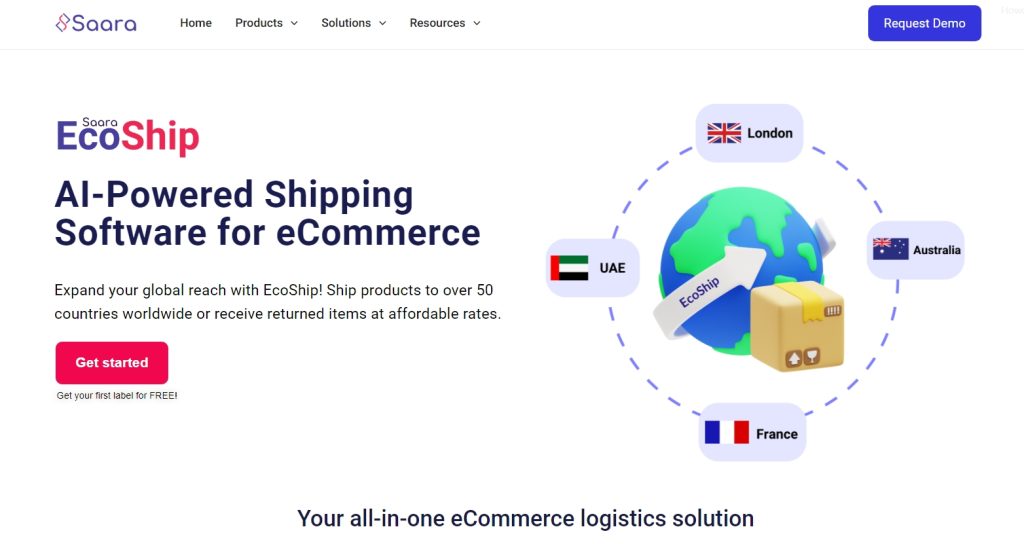Picture this: you’ve meticulously crafted your online store, fine-tuned your product offerings, and captivated your audience with compelling marketing strategies. But what happens once the orders start pouring in? How do you ensure that your customers receive their purchases swiftly and with the utmost satisfaction?
This is where the importance of selecting the best ecommerce logistics platform comes into play. While efficient shipping solutions are sometimes overlooked in broader discussions about e-commerce, they serve as the pivotal link connecting the digital world of your website to your clients’ physical doorstep.
The global e-commerce logistics industry was estimated by Grand View Research, Inc. to be worth USD 315.82 billion in 2022. A strong growth trajectory is predicted, with a compound annual growth rate (CAGR) of 22.3% between 2023 and 2030.
From order management to inventory tracking, and from carrier selection to delivery optimization, ecommerce logistics platforms serve as the backbone of modern online retail. However, navigating the landscape of ecommerce logistics platforms can feel like traversing a maze, with a multitude of options boasting varying features and functionalities.
In this article, we’ll delve into the top trends shaping the future of ecommerce logistics platforms. Join us as we explore the essential features, advantages, and factors that can significantly impact the performance of your online business.
Let’s first explore the key factors to consider when choosing an e-commerce logistics platform. Following that, we’ll delve into the top trends shaping the future of logistics platforms in the e-commerce landscape.
Essential Considerations When Choosing an eCommerce Logistics Platform:
Scalability: Ensure the ecommerce logistics platform can scale alongside your business growth, handling increasing order volumes, expanding product lines, and evolving logistical needs without compromising efficiency or service quality.
Integration Capabilities: Seamless integration with your e-commerce platform is essential for smooth operations. Look for an ecommerce logistics platform that easily integrates with popular platforms like Shopify, WooCommerce, Magento, or your custom-built system. This integration should facilitate automatic order processing, inventory synchronization, and real-time updates between your online store and the logistics system.
Multi-Carrier Support: Opt for an ecommerce logistics platform that offers support for multiple carriers. This allows you to choose the most cost-effective and reliable shipping options for each order. Ensure compatibility with a variety of carriers, including national and international providers, to cater to diverse shipping needs.
Advanced Tracking and Visibility: Real-time tracking and visibility into the status of shipments are crucial for both you and your customers. Look for an ecommerce logistics platform that provides comprehensive tracking features, including order status updates, shipment location tracking, and delivery confirmation. Enhanced visibility enhances customer satisfaction and allows you to proactively manage logistics operations.
Efficient Order Fulfillment: Efficient order fulfillment processes are vital for timely delivery and customer satisfaction. Choose an ecommerce logistics platform that offers streamlined order processing, inventory management, and warehouse operations. Features such as batch processing, automated picking and packing, and inventory optimization tools can improve efficiency and minimize errors in fulfillment operations.
Flexible Shipping Options: Customers expect flexibility when it comes to shipping options. Select an ecommerce logistics platform that offers a range of shipping methods, including standard, express, and same-day delivery, as well as various delivery timeframes and pickup locations. Flexible shipping options cater to diverse customer preferences and increase the likelihood of purchase completion.
Cost-Effectiveness: Assess the cost-effectiveness of the ecommerce logistics platform, considering both initial setup costs and ongoing fees. Look for transparent pricing structures and evaluate the value provided in terms of features, performance, and customer support. Consider factors such as shipping rates, transaction fees, storage costs, and any additional charges associated with the logistics platform.
Reliable Customer Support: Reliable customer support is essential for resolving issues promptly and ensuring smooth operations. Choose an ecommerce logistics platform provider that offers responsive customer support services, including technical assistance, troubleshooting, and account management. Assess the availability of support channels, response times, and the quality of assistance provided to determine the level of support offered.
Now, let's delve into the trends that are shaping the future of e-commerce logistics platforms:
1. Advanced Technology Integration for Efficiency
In the quest for operational excellence, e-commerce logistics platforms are embracing cutting-edge technologies to streamline processes and enhance efficiency.
Artificial Intelligence (AI) and Machine Learning (ML): By leveraging AI and ML algorithms, logistics platforms optimize route planning, demand forecasting, and inventory management. These technologies analyze vast amounts of data to identify patterns, predict demand fluctuations, and optimize supply chain operations in real-time.
Internet of Things (IoT) Devices: The integration of IoT devices enables logistics platforms to gain real-time visibility into the supply chain. IoT sensors embedded in vehicles, packages, and warehouses provide valuable data on shipment location, temperature, humidity, and other environmental factors. This data facilitates proactive decision-making, ensuring timely interventions to prevent disruptions and maintain product integrity.
2. Omnichannel Integration for Seamless Experiences
In today’s omnichannel retail landscape, customers expect a seamless shopping experience across all touchpoints. E-commerce logistics platforms are responding to this demand by integrating with multiple sales channels and fulfillment centers.
Multi-Channel Order Management: Robust order management systems consolidate orders from various sales channels, enabling efficient fulfillment processes. Whether orders originate from a website, mobile app, social media platform, or brick-and-mortar store, logistics platforms ensure seamless order processing and timely delivery.
Unified Inventory Management: Centralized inventory management systems provide a holistic view of stock levels across warehouses and sales channels. This visibility enables accurate demand forecasting, optimized inventory replenishment, and efficient allocation of resources. By maintaining optimal stock levels, logistics platforms minimize stockouts, reduce excess inventory, and enhance customer satisfaction.
Sustainability Initiatives for Environmental Responsibility
With increasing awareness of environmental issues, e-commerce logistics platforms are adopting sustainable practices to minimize their ecological footprint and promote environmental responsibility.
Green Logistics Solutions: Logistics platforms are implementing eco-friendly initiatives such as route optimization, fuel-efficient transportation, and sustainable packaging materials. By optimizing delivery routes and reducing fuel consumption, these initiatives minimize greenhouse gas emissions and contribute to environmental conservation.
Reverse Logistics Optimization: Effective management of reverse logistics processes is essential for minimizing waste and maximizing resource utilization. Logistics platforms are enhancing reverse logistics capabilities to facilitate product returns, refurbishment, recycling, and disposal. By streamlining reverse logistics processes, these platforms reduce landfill waste, promote circular economy principles, and enhance sustainability.
Customer-Centric Solutions for Enhanced Satisfaction
In an era of heightened customer expectations, e-commerce logistics platforms are focusing on delivering exceptional customer experiences through personalized services and enhanced communication channels.
Real-Time Visibility and Communication: Providing customers with real-time visibility into the status of their shipments enhances transparency and fosters trust. Logistics platforms offer tracking tools and proactive notifications that keep customers informed about the progress of their orders from warehouse to doorstep. By offering transparent communication channels, logistics platforms empower customers to track their shipments, manage delivery preferences, and receive timely updates on delivery status.
Flexible Delivery Options: Recognizing the importance of flexibility in delivery options, logistics platforms offer a range of choices to accommodate diverse customer preferences. Same-day delivery, next-day delivery, express shipping, and alternative pickup locations are among the options available to customers. By providing flexible delivery options, logistics platforms cater to the individual needs of customers, enhance convenience, and improve overall satisfaction.
Data-driven Insights for Strategic Decision-making
In the age of big data, e-commerce logistics platforms are harnessing the power of data analytics to gain actionable insights into supply chain operations and drive strategic decision-making.
Predictive Analytics for Demand Forecasting: By analyzing historical sales data, market trends, and external factors, logistics platforms can predict future demand with greater accuracy. Predictive analytics algorithms use machine learning techniques to identify patterns, forecast demand fluctuations, and optimize inventory levels. By anticipating demand shifts in advance, logistics platforms minimize stockouts, reduce excess inventory, and improve overall inventory management efficiency.
Performance Metrics and KPIs: Monitoring key performance indicators (KPIs) and performance metrics is essential for evaluating the effectiveness of logistics operations and identifying areas for improvement. Logistics platforms track metrics such as on-time delivery rates, order accuracy, inventory turnover, and customer satisfaction scores to measure performance against predefined targets. By analyzing performance data and identifying trends, logistics platforms can optimize processes, enhance service levels, and drive continuous improvement initiatives.
EcoShip:
EcoShip emerges as a centralized ecommerce logistics platform dedicated to refining operations and fostering efficient management of shipments, labels, and pickups, all through a unified dashboard. With EcoShip, businesses can effortlessly ship products to over 50 countries worldwide or efficiently handle returned items at economical rates, empowering them to extend their global presence while upholding cost-effectiveness.

Centralized Operations: Streamline your logistics operations by efficiently managing shipments, labels, and pickups from a single, unified dashboard. This centralized approach simplifies logistics management, boosting operational efficiency and productivity.
Global Reach: Seamlessly connect with major shipping carriers such as FedEx, DPD, UPS, USPS, and local carriers worldwide. EcoShip’s extensive network and custom declaration capabilities enable businesses to reach customers across the globe effortlessly, facilitating seamless international transactions.
Label Generation and Pickup: Simplify the shipping process with EcoShip’s intuitive features for generating shipping labels, sending purchase links to customers, and scheduling pickups directly from the platform. These streamlined processes optimize logistics operations and minimize manual intervention, saving valuable time and resources.
Shipping Insurance: Safeguard your shipments against unforeseen events by insuring them directly through the EcoShip platform. With shipping insurance in place, businesses can provide customers with peace of mind, ensuring their orders are protected and enhancing overall satisfaction.
Real-Time Order Tracking: Gain comprehensive visibility into the status of every order with EcoShip’s real-time tracking feature. Monitor the progress of shipments as they move through the supply chain, all from a single dashboard. This transparency fosters trust and confidence among customers, enhancing their overall experience.
Quality Control: Maintain stringent quality standards throughout the shipping process with EcoShip’s built-in quality control mechanism. From packaging to transit, inspecting items for potential damage or mishandling, ensuring orders arrive in pristine condition and minimizing the risk of returns or customer dissatisfaction.
Calculate your shipping rate for free here: Shipping Rate Calculator
In conclusion, the seamless operation of an online store extends beyond the digital realm and into the realm of logistics, where timely delivery and customer satisfaction reign supreme. Selecting the right ecommerce logistics platform is not just a matter of convenience; it’s a strategic decision that can make or break the success of your business.
As we’ve explored in this article, the landscape of ecommerce logistics platforms is evolving rapidly, driven by technological advancements, shifting consumer expectations, and a growing emphasis on sustainability and customer-centricity. From scalability and integration capabilities to advanced tracking and sustainability initiatives, there are myriad factors to consider when choosing a platform that aligns with your business goals and values.
By staying abreast of the latest trends, leveraging innovative solutions, and prioritizing customer satisfaction, you can navigate the complex landscape of ecommerce logistics with confidence and propel your business to new heights of success in the digital age.



